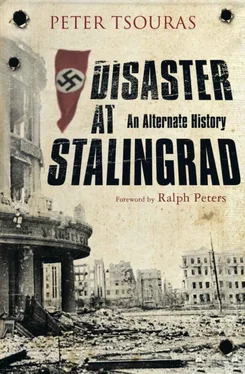Huge amounts of field telephone wire, radios, radar sets and other communications equipment were filling a void. The Soviets had a phobia about communicating by radio and preferred wherever possible to use telephone wire, which they could not have done without American aid. American Ford, Willys and Studebaker trucks and jeeps were making up the grave shortfall in Soviet production of these vehicles.
As important was the growing amount of food for a country whose most productive agricultural areas were now producing food for the Germans. American dehydrated eggs were soon known as Roosevelt’s eggs, a play on the word Russian word yaitsa which means both eggs and testicles. Canned spam and other meat called tushonka, stewed pork in gelatin, were becoming common along with beans, dried peas, butter, vegetable fat, oil and margarine, canned or dried milk, grits and coffee. 28Not a few amazed German soldiers would be lectured by their officers when they would capture a Studebaker truck filled with American canned food that the Americans would someday pay for all this.
The Americans, had they known, should have worried. Stalin was playing a deep strategic game. In December, when the Germans were within miles of the Kremlin, he had sternly reminded the panicking General Staff that the Germans were only a temporary enemy. The main enemy, the glavny vrag, was the United States. Lenin had so identified the Americans as the most dangerous of communism’s enemies, as did Hitler. It was this ideological legacy of the founder of Soviet power that legitimized Stalin in the eyes of the party and people, and the part about enemies he took with deadly seriousness.
That did not keep him from bargaining for every ton of wheat, fats, aviation fuel or aluminium, every bullet, truck or plane he could squeeze from the Americans. The myriad influential Americans sympathetic to the Soviet Union would pressure their government into pouring forth the materials of war.
They did not work alone. Inside the US Government, agents of the NKVD, Soviet military intelligence (GRU) and members of the Communist Party of the United States (CPUS) worked directly on orders from Moscow. Roosevelt’s chief advisor, Harry Hopkins, who played a critical role in the Lend-Lease talks, was a Soviet agent. Most important of them was Dexter White, Assistant Secretary of the Treasury, who had got himself appointed to oversee all Lend-Lease shipments to his master in the Kremlin. White ensured that the US armed forces were not allowed to make any inquiries on the operational use or performance of any of the equipment sent to the Soviets. The Soviets refused to allow the Americans to send observers and technicians to the Eastern Front. 29
The Soviets were all too often non-cooperative or even hostile to Britons and Americans working in the Soviet Union on Lend-Lease aid; some of them were arrested to disappear into the Soviet gulag. Those naval and merchant marine personnel who arrived in Soviet northern ports discovered that they were not out of danger once they had docked. The main port of Murmansk was regularly bombed by the Luftwaffe from bases in Northern Norway. Then they were shocked by what they experienced at the hands of their allies. They often found the Russians charming but terrified of being seen to fraternize with Westerners by the NKVD. Added to that was the abject poverty seen in the ports, the zombie-like slave labour from the gulag and German POWs used to unload ships, the brutal medical care, ‘the numerous petty formalities, the passes and visas, the plethora of guards and the prohibition of movement’, all of which strained the morale of everyone involved. It certainly killed any flirtation with communism in many of them. 30
CHAPTER 2
A Timely Death

In the air over the Tirolian Alps, 23 April 1942
Grossadmiral Erich Raeder had much to think about in his long flight from Rome to Berlin that morning. 1He was not distracted by the beauty of the mountains before him or the Isonzo River, a silver trickle between the peaks, a vertical battlefield where hundreds of thousands of Italians had been slaughtered in eleven battles against the Austrians in the Great War.
For Raeder, who had commanded the Kriegsmarine since 1928, the problem uppermost in his mind was Hitler’s dilettante approach to naval warfare. 2The man was as clueless as Napoleon had been about naval power, and it was naval power that kept Britain in the war. The emperor had commented ruefully, ‘Wherever wood can swim, there I am sure to find this flag of England,’ 3a sentiment Hitler by this time no doubt shared. And as with Napoleon it was likely to be his undoing.
When the war started the Kriegsmarine could array against the might of the Royal Navy only 11 cruisers or larger ships, 21 destroyers, and 57 U-boats. The Navy did not even have its own aviation arm. It had to depend on Göring’s Luftwaffe. The overbearing Reichsmarschall had jealously declared, ‘Everything that flies belongs to me.’ 4Not surprisingly, Goring allocated barely 5 per cent of the Luftwaffe’s aircraft to support the Navy despite its complex requirements. Raeder had counselled Hitler against going to war with Great Britain until the German naval building programme was completed in 1945. Otherwise, he had bluntly told Hitler, the Kriegsmarine’s only option in a naval war with the Royal Navy was to die gloriously.
Raeder just shook his head at how easily Hitler was influenced by men like Hermann Goring, who never lost an opportunity to disparage the Navy in favour of his precious Luftwaffe. Before the war, Hitler had taken a great interest in naval matters and a great pride in the heavy ships slipping off the German shipyard ways. As the war had sunk in the mire of Russia, his enthusiasm had become merely sympathy for the Navy’s problems that yielded not a Reichsmark of further resources. Now his meetings with Raeder were more likely to provoke a denunciation of the Navy as being a relentless futility since the war with Denmark in 1864 with the shining exception of the U-boats. He had threatened to scrap all the heavy surface ships. Raeder had responded in a memorandum that stated bluntly, ‘England, whose whole warfare stands or falls with its control of its sea communications, will consider it as good as won if Germany scraps its ships.’ 5
Where to begin, he thought? The Führer takes no serious interest in the Mediterranean, that which the British themselves call ‘the sea of decision’. Take the Suez Canal and you mortally wound the British, more even than by taking London. He had urged Hitler to send Rommel to North Africa to march on Suez shortly after the fall of France but had been ignored. In the end, Hitler had sent this remarkable general there, but only to stop the Italians being flung out of North Africa on their ear. Yet, the Canal was still within Germany’s grasp as Rommel made himself a legend handing the British one defeat after another. The problem was Malta, though, that island in the centre of the sea from which the British savaged Rommel’s seaborne logistics. Raeder had begged Hitler to take it, but after the heavy losses in the airborne and seaborne invasion of Crete the year before, he was loath to risk it. Consultations with the Italian naval staff over just such an operation were what had taken him to Rome. The Italians were not enthusiastic. He was not surprised. They did not like to get hurt, and the war for them so far had entailed nothing but hurt and humiliation. They would follow only if Germany led. And Hitler was not so inclined.
Even more distressing was Hitler’s failure to understand the concept of a balanced fleet. He was all enthusiasm for the U-boats that were savaging the Allied merchant fleets under the command of the remarkably able Admiral Karl Dönitz, but he had nothing but contempt for the surface fleet. He remembered Germany’s huge investment in its First War navy which fought only one major battle and then rusted away to mutiny in 1918.
Читать дальше













